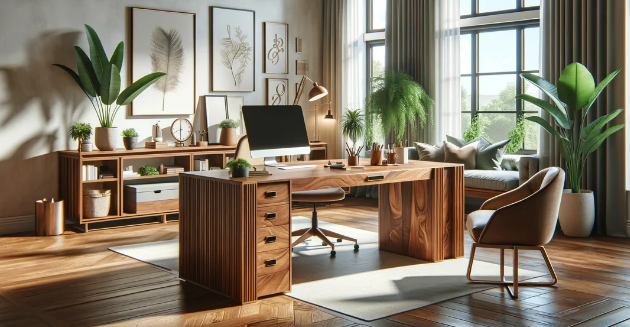The current trend in office design leans towards spaces that are functional, personally resonant, and aesthetically engaging. This paradigm shift has led to a growing appreciation for handcrafted office furniture in Tulsa and beyond, with discerning individuals seeking pieces steeped in craftsmanship and quality. Handmade furniture offers a palpable connection to artisans’ skills, fostering an office environment rich in stories and history while concurrently empowering productivity and creativity.
The Beauty of Craftsmanship
The defining quality of handcrafted furniture is the precision and care applied to its creation. Craftsmen tap into deep experience and meticulous attention to detail to construct pieces that stand out in any setting. The result is office furniture that serves a practical purpose and inspires and sparks creative energy throughout the workspace. Artisanal pieces resonate with a heritage of expertise, passion, and meticulous dedication rarely found in standard retail offerings.
Durability and Longevity
Investing in handcrafted office furniture means investing in enduring quality. Seasoned craftspeople choose the finest materials and employ traditional techniques that lead to sturdy, long-lasting pieces. The durability of such furniture signifies not only an office space’s aesthetic appeal but also its functional longevity, negating the cycle of frequent replacements that come with mass-produced items and making a compelling case for sustainability.
The Psychological Impact of Aesthetic Workspaces
The influence of an office’s visual and physical environment on its occupants can be profound. A well-designed space with beautifully crafted furniture can significantly increase job satisfaction and psychological well-being. This correlation is supported by research into the impact of workspace design, including a study by the BBC on the advantages of wooden office design, which found that natural materials greatly benefit workplace atmosphere and productivity.
Eco-Friendly Materials in Furniture Making
Many handcrafted furniture makers stand at the forefront of eco-friendly practices. They often utilize locally sourced or reclaimed materials and adhere to environmentally sound manufacturing processes. This dedication to sustainability is better for the planet. It aligns with the values of the modern consumer, who seeks to minimize their environmental footprint in both their personal and professional lives.
Investing in Quality: A Cost-Effective Approach
While handcrafted furniture may initially come with a higher cost than its mass-produced counterparts, the investment is cost-effective in the long term. Durable construction and timeless design lead to fewer replacements and maintenance. The wisdom in choosing quality is exemplified in a piece by The New York Times, which delves into the public’s rekindled respect for furniture craftsmanship, encapsulating such choices’ economic and aesthetic sensibility.
Design Flexibility of Handcrafted Furniture
The personalization possible with handcrafted furniture is virtually limitless. Artisans can align their designs with each client’s specific vision and needs, crafting pieces that make the most of an office’s space and environment. This flexibility is especially critical when standard models fall short of meeting unique office layouts or organizational requirements, enabling a perfect blend of form and function.
The Connection to Tradition in Our Workspaces
An office adorned with handcrafted furniture connects deeply to the artisans’ rich heritage. These workspaces become storied environments that reflect the time-honored skills passed down through generations, adding depth and history to everyday interactions and stirring a collective respect for craftsmanship.
Supporting Local Craftsmen and Artisans
Choosing handcrafted over mass-produced furniture bolsters local economies and supports the continuation of artisanal trades. Patrons of these crafts help sustain a vibrant and diverse marketplace, allowing for the preservation of specialized skills that the ubiquity of industrial manufacturing might otherwise diminish.
Furniture as Heirlooms: Passing Down Stories
Office furniture crafted by hand has the unique potential to exceed its original purpose and become part of a company’s legacy. These pieces hold memories and embody an organization’s narrative; as such, they can be passed down through the ages, holding continued significance and value as beloved heirlooms.
Choosing the Right Pieces for Your Office
Selecting the appropriate furniture for an office requires looking beyond aesthetics to consider aspects such as ergonomics, corporate identity, and the intangible quality that only artisanal craft can bring. The right pieces can create an environment conducive to productivity and demonstrate a company’s character and ethos.
The Future of Handcrafted Office Furniture
The future of office design is shaping into an arena where attention to sustainability, personalized spaces, and ethical consumer choices are paramount. Handcrafted furniture exemplifies these principles, offering an enduring appeal that will likely grow as businesses seek spaces that reflect their values and aspirations for quality and integrity.

